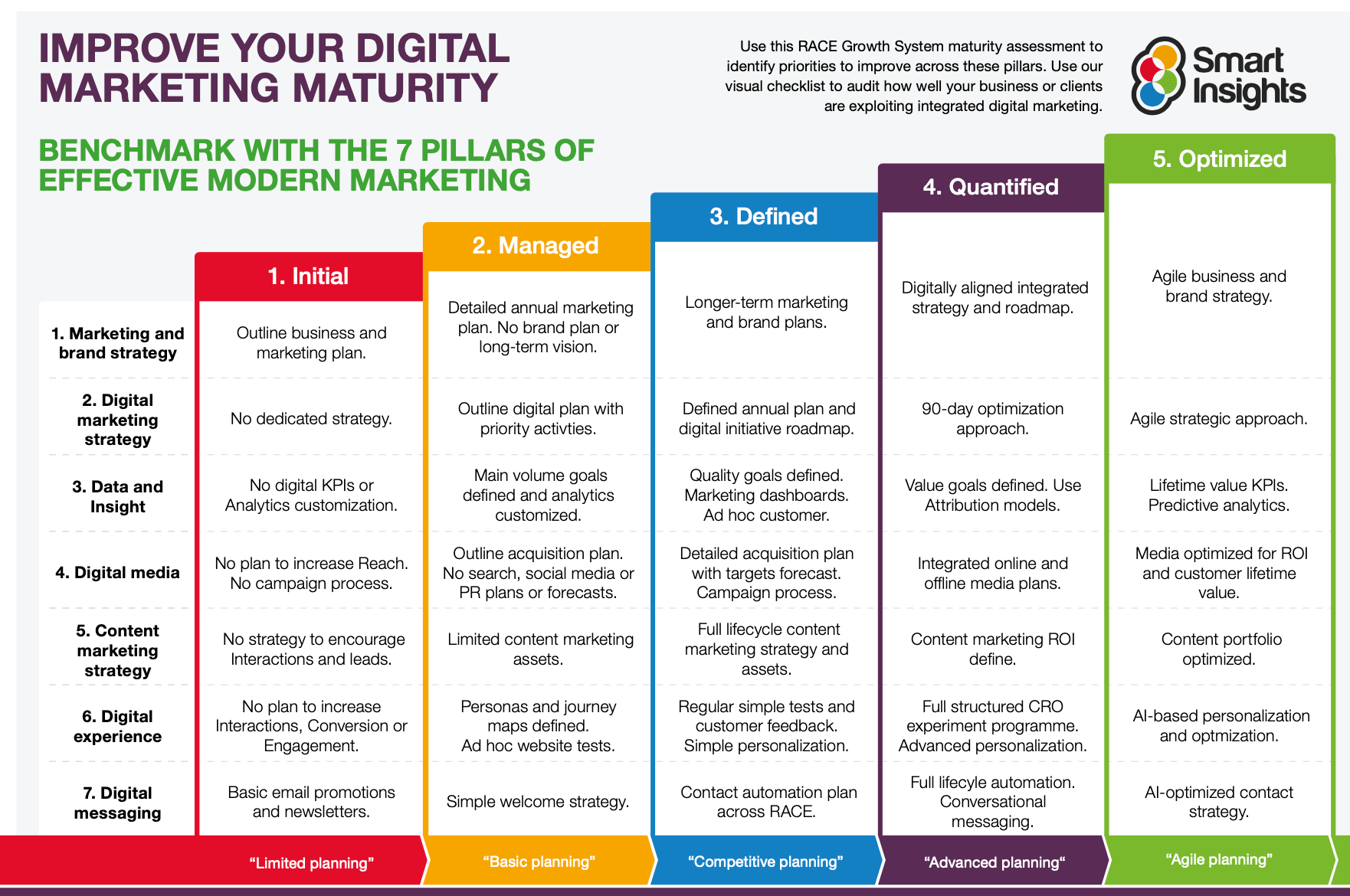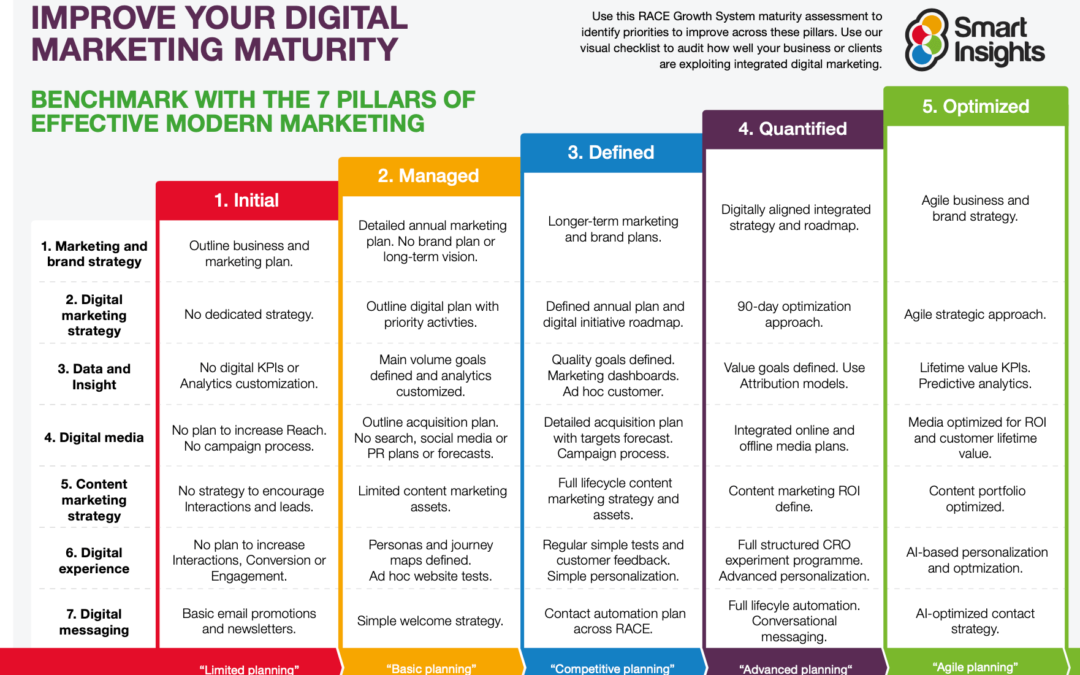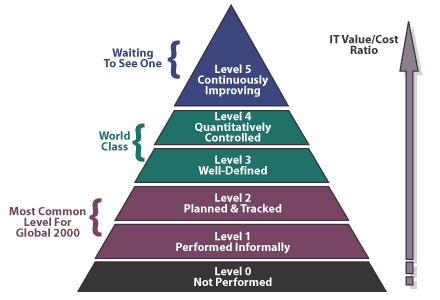Using capability maturity models to audit your digital maturity and set targets to improve digital marketing effectiveness
We’ve been adding to our visual tools to help all members assess how well their businesses are adapting to using digital media and technology and to set targets to improve their results from digital marketing.
We have collected these visuals together in a single download so that you can easily review them and print the most relevant for you. We’ve designed them to members can use them for different scales of business and roles. There are more than 10 templates which cover:
- Digital marketing for small and medium businesses using our RACE framework
- Digital transformation for larger businesses
- Digital channel marketing activities including SEO, Social media, email and content marketing
You can see one example, which I designed for reviewing digital marketing effectiveness with senior leaders in small and medium or larger businesses. The other templates are more granular looking at specific digital marketing activities using our RACE framework.

Members can also use our Capability graders, which are free, interactive versions enabling you to compare your score to other members (anonymously) and get recommendations on which resources can help you improve your score.
Of course, capability graders and improvement recommendations are most useful to businesses that are actively trying to improve their digital marketing strategies. If you’re still looking for buy-in for digital marketing activities or optimization, you could start by reading up on ‘10 reasons why you need a digital marketing strategy‘.
What is the 5 point benchmarking scale based on?
In this article I’ll explain the background to these capability reviews – I have to go back a while since I first became aware of the benefits of doing this type of process benchmarking back in the early 1990s!
Do you know the Carnegie Mellon Capability Maturity model (CMM)? That’s where my inspiration for benchmarking businesses for digital marketing originally came from. It’s likely that you don’t, if you work in marketing, unless your background is similar to mine.
I used to manage software development back in the day, before the web, yes that long ago…
Back then I used to manage small teams to create packaged software used by thousands of engineers worldwide, so it was important that we minimized defects when we shipped a new release. Of course, every major bug irritates customers and generates support and rework.
So the team leaders and I worked hard to implement a quality management system process for creating new software updates to minimise bugs – many who are involved with managing updates to web and E-commerce sites will be familiar with requirements specs, prototypes and testing schedules, although this was before Agile and Scrum.
As part of trying to improve our development processes, we used to find it useful to apply capability maturity models to benchmark against competitors. They help you be more objective about your capabilities and know where improvements are needed. In the classic CMM model there are 5 or 6 clearly defined stages as shown in this Maturity model example:
The story behind developing these digital marketing maturity benchmark tools
When I switched from software development to marketing to lecturing in the business school in the University of Derby around 1995, the web was in its infancy and there were a lot more problems with managing site performance and content than there are today. Remember those quaint “under construction” signs. Laughable now!
Many managing the adoption of digital technologies by their companies were based with a similar problem to the software developers. They needed to develop a robust, repeatable process that would enable them to deliver a service that was effective both for their customers and their commercial goals. Many still do. So this is where reviewing your capabilities can help.
If you’re new to digital marketing, don’t forget to check our top 18 recommended digital marketing techniques by asking ‘what is digital marketing?‘.
Using benchmarking or scoring of your digital maturity can help:
- 1 Audit current approaches to digital marketing to identify areas for improvement;
- 2 Benchmark against competitors who are in the same market sector;
- 3 Identify best practice from more advanced adopters;
- 4 Set targets and develop strategies and roadmaps for improving capabilities through time;
- 5 Communicate the current situation to colleagues budget holders and highlight investment priorities in for different activities.
This need for well-managed processes is still the case, particularly with ongoing developments in the technology for delivering customer experiences across mobile and desktop and the need to integrate content and social media from multiple sources. Given that digital marketing is “Always-on”, it makes sense to benchmark the overall capability of digital marketing using a simple scoring system.
I used to participate in Workshops at Cranfield School of Management where capability models developed by Professor Hugh Wilson were reviewed with companies participating in a benchmarking group. This rang a bell, so it gave me the idea to apply what I had learned of CMM for software development and apply it.
Benchmarking frameworks for Smart Insights Business Members
I originally developed capability benchmark spreadsheets on personal consulting projects for brands like Barclaycard, BP and Mercedes Benz where I interviewed stakeholders asking them to assess their digital capabilities on a detailed scale.
A version of this was referenced later in the Econsultancy Managing E-commerce Teams reports I worked on in 2005 and 2008 and more recently have updated them to the Smart Insights Digital marketing strategy audit which is structured around the RACE Planning framework – it’s where we recommend Expert members start their improvements to digital marketing.
We also have an online retail capability benchmarking audit by Chris Jones. I got in touch with Chris since I admired the auditing approach in his Multichannel Retail Handbook and we arranged to share it with Smart Insights members.
Free Interactive Benchmarking tool
After developing many digital benchmarking spreadsheets and marketing strategy audits, I wanted to take digital benchmarking to the next level by having an interactive tool that could be used to score a business digital marketing capabilities and make recommendations to improve.
That’s what our interactive digital strategy benchmarking tool does. By scoring your business capabilities across all areas of the RACE planning framework you will be given a score and recommended resources and e-learning models to help you improve your business capability to use digital marketing effectively.



